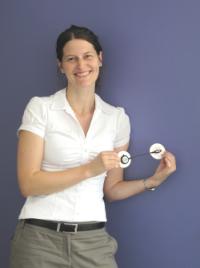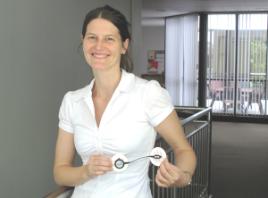The hills once alive with the sounds of independently mobile children
Published on 14 April, 2011
As a girl, Stephanie Schoeppe cycled up hill and down dale on her way to school and to visit friends in the small town of Bad Lauterberg, nestled in a mountainous area of north-west Germany.
Now working in Rockhampton, Queensland, she is about to begin a study looking at the activity and travel behaviours of Rockhampton children and the impacts this has on their health. Stephanie's research is part of a wider national study of children's activity and travel behaviours funded by the Australian Research Council.

Physical activity researcher Stephanie Schoeppe
Only a generation ago, children spent more time walking, cycling and just generally playing in and exploring their neighbourhood. Nowadays many children are faced with the opposite scenario; they are frequently driven to the destinations they used to walk or cycle to and spend less time playing and exploring their neighbourhood. Stephanie's research will be an in-depth investigation of how these different behaviours impact the overall activity levels and health of children.
Stephanie will use an activity monitor (see picture) that collects information on heart rate and body movement to measure activity. She will also ask children how much time they spend doing sedentary activities like TV, video games and reading.
Another important part of the research is to ask children about the social aspects of their neighbourhood to understand how their activity patterns influence children's social connections, or their social well being.
As a PhD candidate at CQUniversity's Centre for Physical Activity Studies (CPAS), Stephanie will also share her results with researchers from other universities collecting the same data from school children in Brisbane, Melbourne and Perth.
"I'm especially interested in ‘how ' (in terms of frequency, duration) roaming around and exploring the neighbourhood or active travel to school, and other places is related to physical activity, sedentary behaviour, weight status and social well being ," Stephanie says.
"This evidence is important for policy makers who are involved in decisions on creating policy, built and social environments that may positively influence children's independent mobility and active travel, and ultimately their health and social well-being.
"I aim to investigate associations of children's independent mobility and active travel with levels of physical activity (at light, moderate and vigorous intensity), sedentary behaviour, weight status and neighbourhood social capital.
"Key hypotheses are that children with higher levels of independent mobility and active travel will have significantly higher levels of physical activity, lower levels of sedentary behaviours, lower weight status, and higher levels of perceived neighbourhood social capital compared to children with lower levels of independent mobility and active travel."
Stephanie's research is related to the larger Australian projects, Independent Mobility, Active Travel and Children's Health (iMATCH) and Children's Activity, Travel, Connectedness and Health (CATCH).
Stephanie will be inviting children in the Rockhampton area to take part in the research in the coming months.


